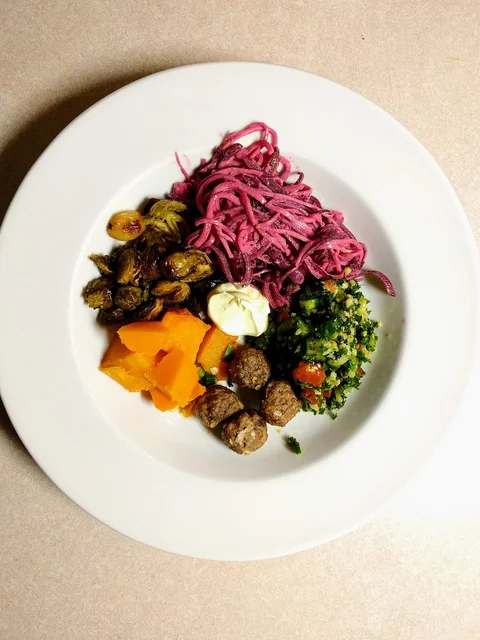The Whole30 Diet: What is it?
A comprehensive diet program that lasts for 30 days, the Whole30 diet promotes health and reduces inflammation. It also resets your body's natural metabolic equilibrium. Whole30 emphasizes whole food, including fruits, vegetables and lean meats. It also includes healthy fats such as eggs, milk, sugar, lactose, legumes and grains. Many common allergens, inflammatory agents and foods that could cause problems with digestion and other issues are eliminated. Participants are asked to be mindful of how their food affects them and to pay attention to what they eat. Participants are allowed to return certain foods into their diet after the 30-day period.

The Whole30 Diet's Benefits
Many benefits have been associated with the Whole30 diet, such as weight loss, improved digestion and energy, greater mental clarity, reduced inflammation, and better sleep. The Whole30 diet has been shown to reduce blood pressure and cholesterol, as well improve insulin sensitivity. The Whole30 diet encourages mindfulness eating, which may lead to healthier meals and better nutrition.
- Weight Loss
- Improved Digestion
- Increased energy levels
- More Sleep
- Increased mental clarity
- Reduction in Inflammation
- Lower Cholesterol levels
- Lower blood pressure
- Increased Insulin Sensitivity
- Healthy Meals
- Improved Nutrition
The Whole30 Diet: Side Effects and Drawbacks
The Whole30 diet offers many advantages, but it's important to remember that the Whole30 program can have side effects and disadvantages. Some people might experience withdrawal symptoms such as fatigue, headaches, irritability and cravings after removing certain foods from their diets. Due to its strict nature, it may prove difficult to stick to the Whole30 plan over the long-term. The diet doesn't provide sufficient calories for athletes or those with high levels of activity, since it excludes many carb sources.
The Whole30 Diet: Expert and Professional Opinions
Experts and health professionals agree that the Whole30 is a safe and effective way to boost your metabolism and improve your overall health. Experts recommend Whole30 as a method to lower inflammation and improve digestion. The American Heart Association and Academy of Nutrition and Dietetics have endorsed the Whole30 diet for their positive effects on health.
How to get started on Whole30
Although Whole30 can appear daunting at first, with some preparation it is possible to make the process easier. It is essential to be familiar with all the requirements of the Whole30 diet and what foods you are permitted and prohibited. Next, create a meal program for the next 30 day. You can plan your week ahead and prepare meals in advance. Also, make sure you stock up on Whole30 approved ingredients in your fridge and pantry. It is crucial to stay hydrated and get enough rest throughout this 30-day period.
- Get familiar with the Program Rules
- For the next 30 days, create a meal plan
- You can stock your refrigerator and pantry with Whole30-approved ingredients
- Keep hydrated
- Take Plenty of Retired Time
- Meditation and Mindful Eating
How to make the Whole30 Diet easy and quick
These steps will make the Whole30 easier and faster. It is a great way to simplify the Whole30 diet by prepping meals in advance. Pre-cooking meats, cutting vegetables and making sauces can all be done in advance. Batch cooking and meal prep can save you time and money. You should also look for recipes that can be prepared quickly and easily. It is important to stick with the basics. Keep meals simple, focus on healthy fats, protein, and vegetables.
- Prepare Meals ahead of Time
- Batch cooking and meal prep
- These recipes are quick and easy to prepare
- Keep it simple
Here are some examples of how the Whole30 diet works
Whole30 is about whole foods and not processed food. You can prepare Whole30-friendly meals such as breakfast bowls, roasted salmon, eggs and vegetables, roasted salmon and sweet potato skewers, and healthy, protein-rich salads, including avocados, olive oil and nuts. There are also Whole30-friendly snack options like almonds, hard-boiled eggs and fruit and nut bars.
Alternatives and why the Whole30 Diet is better than them
You can also choose from the Paleo, ketogenic, or Intermittent Fasting alternatives to Whole30. The Whole30 diet is different from other diets because it has many unique features. Whole30 is all about mindful eating, and how your food affects you. The Whole30 diet also eliminates common allergens, inflammatory agents and other harmful substances that could cause problems with digestion and other issues. The Whole30 diet encourages people to eat whole foods and not processed.
Conclusion
Whole30 is a 30-day diet that aims to improve your health and reduce inflammation. Many benefits have been associated with the Whole30 diet, such as weight loss, better digestion, energy, sleep quality, mental clarity and decreased inflammation. Nutrition experts and health professionals agree that Whole30 is a safe and effective way to reset your metabolism and improve one's overall health. The Whole30 diet can help improve your overall health if you are careful about what you eat and how it is prepared.